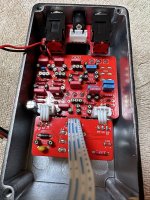eh là bas ma
Well-known member
If you live in europe, musikding full kits are a cheap and simple way to start. Their kits are great quality and very neatly bagged and tagged. Every resistors have a label, etc.
Just have a look on the reviews and pick any project you like.
I'm in France and I order from Germany because they have germanium parts (forbidden in France), the largest choice of kits, thousands of them, and good prices.
Musikding Kits
Ready to solder kits for effect pedals for guitar and bass. You can find all documents linked inside the article description, in the tab Documents and schem


